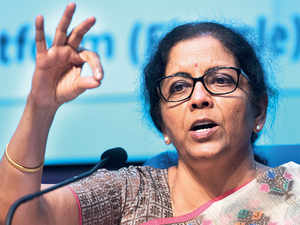
“We think we will attract investment by reducing tax rate,” she told Parliament, while adding that several countries had done the same. She was speaking during the debate on the Taxation Laws (Amendment) Bill that was passed by the Lok Sabha, replacing a September 20 ordinance. The MAT clarification would have come as a relief as the text of the bill had said the relief would be applicable from the next financial year rather than the current one as mentioned in the ordinance.
She said it was too early to determine the impact of the corporate tax cut, but a number of domestic and foreign manufacturing entities had evinced interest in investing in the country.
Sitharaman said the move will help attract investment from multinationals looking to shift operations from China in view of its trade war with the US.
She rejected the accusation that the government was helping out large corporates.
“I want to tell them that corporate tax cut helps all—small and big businesses registered according to Companies Act,” she said.
The government slashed the corporate tax rate to 22%, without exemptions and tax holiday benefits, and lowered it to 15% for new manufacturing entities through an ordinance on September
20. This had also included a reduction in the MAT rate and relief from buyback tax for offers made prior to passage of the budget.
MAT RELIEF
The government has corrected the mismatch in dates on the applicability of the MAT rate.
“This had caused lot of confusion and now the same has been settled post this clarification by the FM,” said Rakesh Nangia, chairman, Nangia Andersen Consulting. However, accumulated MAT credit can’t be utilised by entities switching over to the new 22% regime. However, international financial services centres such as the Gujarat International Finance Tec-City will be able to enjoy the new regime with exemptions.
The minister also clarified that taxes proposed on share buybacks in the budget will not apply to public offers announced on the day of the budget as well.
The bill has also provided a negative list of businesses that will not be entitled for the concessional tax rate of 15%. These include computer software, mining, converting marble blocks into slabs, bottling of gas cylinders, printing of books and cinematographic film. These will not be treated as new manufacturing entities for the purpose of concessional tax.
The government has also partially rolled back the surcharge announced in the budget to attract investment from the foreign portfolio investors (FPIs), she said.
Sitharaman ruled out any cuts in personal income tax saying she would rather like to deal with it separately on merit.
The finance minister also ruled out lowering tax rate for limited liability partnerships or partnership firms, saying their structure was different from a corporate vehicle and did not merit the concessional corporate tax regime.
On the impact of ?1.45 lakh crore corporate tax sop on fiscal defiict, the FM said the NDA government had a good track record. “…We are known by the performance on this front and let the revised estimate stage come,” Sitharaman said adding that slippages may not occur at the end of this fiscal.
She said gross direct tax collections were up by 5% till November.
